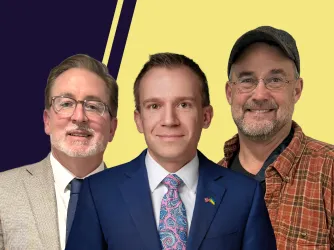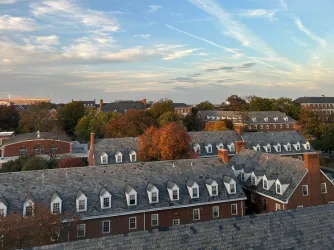Table of Contents
University of Florida to ‘investigate’ pro-Kanye chalk messages for anti-Semitism

Chabad UF Jewish Student & Community Center
Chalk messages written on the sidewalk at the University of Florida were condemned by the school's administration.
Two right-wing provocateurs, Dalton Clodfelter and Tyler Russell, are making their way to campuses across the southern U.S. to argue that “#YeIsRight.” The hashtag, a reference to a spate of recent interviews in which Kanye West disparaged Jewish people, has popped up at three different public universities over the last several weeks and has been used to announce the duo’s upcoming arrival to campuses.
On Feb. 1, chalk appeared on campus reading “Ye is Right,” “Students for Ye,” “Ye 24,” and “Ye for President.” University of Florida is the latest campus on Clodfelter and Russell’s tour. In response, outgoing UF President W. Kent Fuchs released a statement condemning “these and all acts of antisemitism, hatred and intolerance.” Fuchs went on to announce the university police department had initiated an investigation into the messages.
While Clodfelter and Russell are not UF students themselves, FIRE wrote UF this week explaining that as a public institution bound by the First Amendment, it cannot investigate or punish students (the presumed authors of the chalked messages) on the basis of unquestionably controversial yet constitutionally protected speech.
UF’s content-neutral time, place, and manner policies limit where Gators can write chalk messages on campus. Here, the chalked messages appear to have been written in both restricted areas and permissible areas. (FIRE’s stance is that universities may maintain content-neutral policies governing where and how chalk messages can be written on campus, but must be careful not to selectively enforce such policies on the basis of viewpoint.) UF can remove the messages for violating its viewpoint-neutral time, place, and manner policies, but the chalking policy was not cited as the basis for UFPD’s investigation. Instead, UF cited the content of the messages as necessitating a crackdown. This content-based removal will almost certainly lead to a chilling effect on protected student expression.
Decades of First Amendment case law has made clear that messages cannot be prohibited solely for being hateful or offensive. Yet President Fuchs’ statement implies that students and faculty alike risk investigation and potential discipline if their protected expression is subjectively deemed hateful or intolerant.
As we wrote in our letter:
This principle does not waver in the context of public universities, whether the speech is a “heated exchange of views” on race or a “sophomoric and offensive” skit depicting women and minorities in derogatory stereotypes. If authorities could punish expression deemed hateful, it would imperil a broad range of political speech and academic inquiry, and such an exception would undoubtedly be used against those it intended to protect.
FIRE sent a similar letter to University of Alabama earlier this week after it announced its own investigation into similar chalked messages on the Tuscaloosa campus.
Clodfelter and Russell appear to be using these messages to signal their arrival on campus and ruffle the feathers of students and administrators alike. And universities appear to be taking the bait. What these schools don’t seem to realize is that when they look to punish students for protected expression, they’re delivering attention to the very provocateurs they hope to silence.
FIRE defends the rights of students and faculty members — no matter their views — at public and private universities and colleges in the United States. If you are a student or a faculty member facing investigation or punishment for your speech, submit your case to FIRE today. If you’re a faculty member at a public college or university, call the Faculty Legal Defense Fund 24-hour hotline at 254-500-FLDF (3533). If you’re a college journalist facing censorship or a media law question, call the Student Press Freedom Initiative 24-hour hotline at 717-734-SPFI (7734).
Recent Articles
Get the latest free speech news and analysis from FIRE.

Free speech in Trump 2.0
Podcast

The Federal Bureau of Investigation (of protected speech)

The paper was her lifeboat — UMD called it interference


